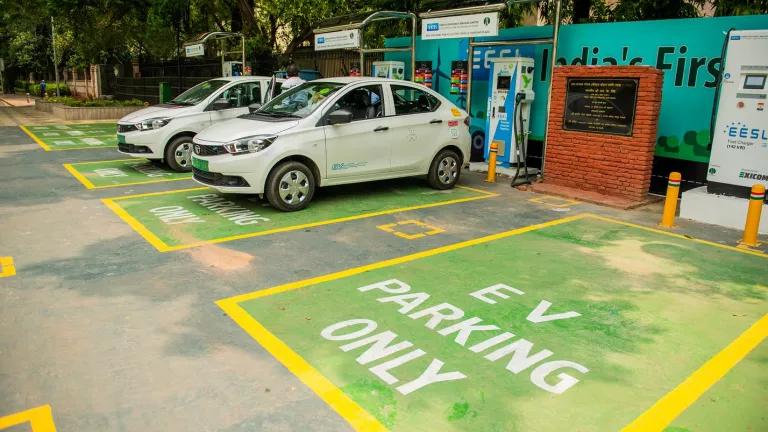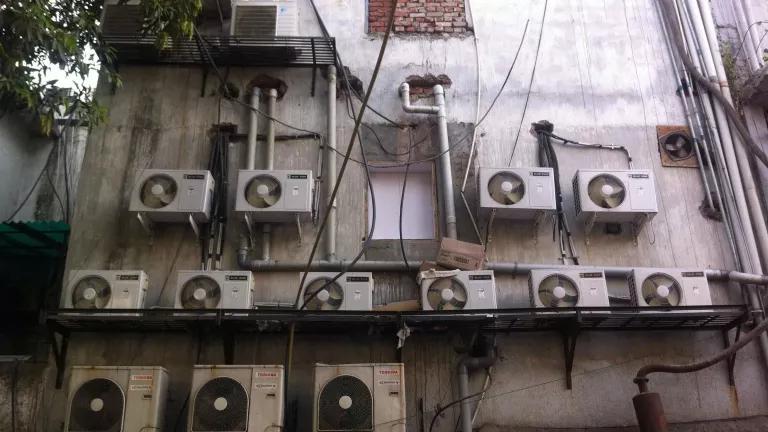
Residential and commercial buildings account for nearly 30% of total electricity consumption in India today. This share is expected to increase to 48%—nearly half of electricity consumption—by 2042. Implementing strategies to reduce energy consumption through efficiency is a central topic of discussion during the ANGAN workshop hosted by India’s Bureau of Energy Efficiency.
Advancing energy efficiency in buildings across India’s cities is critical to saving energy, increasing energy access, combating pollution, and strengthening prosperity. Constructing more efficient buildings is also a central strategy to achieve India’s climate target and is important for the country to meet its targets on reducing cooling loads, an important focus of the India Cooling Action Plan (ICAP) released in March 2019.
Building energy codes are effective tools for achieving energy efficiency in construction and operation of buildings. Working with the state and national government agencies as well as local and international experts, the Ministry of Power’s BEE developed the Energy Conservation Building Code (ECBC) for the commercial buildings in 2007 and amended in 2017. Several states and cities have made strong progress in adopting the ECBC, working with State Designated Agencies (SDAs), Urban Local Bodies (ULBs), leading real estate developers and other stakeholders.
A How-to-Manual: Towering Possibilities in India: Scaling up the Implementation of the Energy Conservation Building Code (ECBC) Across States, a new report (draft) by NRDC and partners Administrative Staff College of India (ASCI), analyzes the latest in implementation of the building energy code in states across India. The purpose of this issue brief is to spur action to save energy through state-wide ECBC implementation across India as part of the country’s domestic goals and international targets. The report also includes five recommendations for states to follow to effectively adopt and implement the ECBC as well as a how-to-manual designed for states to advance energy efficiency implementation.
States that have notified the code include Andhra Pradesh, Haryana, Himachal Pradesh, Karnataka, Kerala, Odisha, Puducherry UT, Punjab, Rajasthan, Telangana, Uttar Pradesh, Uttarakhand, West Bengal. The states of Telangana and Andhra Pradesh have implemented mandatory codes with an online compliance system. Uttar Pradesh and Himachal Pradesh are the only two states that have amended, revised and notified the state code to adopt ECBC 2017. The state of Uttar Pradesh notified the ECBC 2017 version and is enforcing the code by incorporating it in the building bylaws. Most other states are working towards ECBC 2017 adoption and awaiting final approvals.
ASCI and NRDC have worked on increasing energy efficiency in India as well as sharing international best practices with real estate developers and the market stakeholders. ASCI and NRDC are knowledge partners to the states of Telangana and Andhra Pradesh in implementing policy while working with business and stakeholder towards market transformation.
Based on discussions with key state officials, experts and stakeholders, report includes five key recommendations for fast-tracking ECBC implementation at the state level in India.
- Timely notification with high-level steering committees. To advance code notification, stakeholders should engage government officials at the highest levels and create steering and technical committees to champion energy efficient buildings and a clean energy future.
- Clear government agency roles. For each state, stakeholders should map and clearly identify the responsibilities of key government agencies, including state and city level divisions of urban development department, the energy department, and the municipal corporations.
- Strengthen real estate developer engagement. Stakeholders should strengthen engagement with real estate developers at each step, including formal consultations, steering committees, peer-to-peer education, case studies, and more. To accelerate code adoption, stakeholders should deepen engagement with real estate developers by coordinating with the national, state and local real estate developer associations to develop a set of state-specific activities towards advancing energy efficient buildings.
- Deepen capacity building for local experts. Specifically, training and materials to support code implementation and enforcement systems are critical to the compliance infrastructure. Working with BEE and others, stakeholders should develop programs to increase capacity among local architects, engineers and builders to support energy efficient building in their state.
- Expand online compliance tools for building permissions. Several states, such as Gujarat, Haryana, Madhya Pradesh, Kerala, Tamil Nadu, Jharkhand, Uttar Pradesh, Maharashtra and Rajasthan, are in the process of adopting online building compliance tools. Including energy efficiency certification as a requirement of the online application needed prior to receiving building permissions is an effective method to ensuring compliance. To advance efficient buildings, stakeholders should work with the states and software companies developing the online government platforms for building permissions to integrate energy efficiency as a required component.
Scaling implementation and strengthening compliance of building energy codes was a main topic of discussion at the ANGAN in New Delhi hosted by Bureau of Energy Efficiency (BEE) this week. NRDC and partners discussed the important lessons from implementation of the energy codes and the potential to scale up. Global experience in implementation of energy efficiency policies for buildings was also a part of the discussions at ANGAN.
Looking ahead, state action is the key to advancing energy efficiency in India. Energy efficiency is a major opportunity for the Indian economy to save energy and costs. It is also a key strategy to achieve India’s climate targets. NRDC and ASCI and a coalition of partners stand ready to work with states and stakeholders to advance energy efficiency in India.

Highlighted Additional Resources
- Getting Cities Climate Ready
- Online Compliance System For Energy Conservation Building Code (Ecbc) For Hyderabad
- Building a Better Future: Implementing the Energy-Saving Building Code in Hyderabad
- Transforming Cities: Building Efficiency Lessons from Hyderabad
- Taking Energy Efficiency to New Heights: Analysis and Recommendations for the Buildings Sector from the Hyderabad Experience
- Retrofitting Mahindra Towers: How an Innovative ESCO Model Lowers Energy Bills With No Upfront Cost
- Building Smart from the Start: Spotlight on Energy-Saving Commercial Office Building in Noida, India
- Saving Money and Energy: Case Study of the Energy-Efficiency Retrofit of the Godrej Bhavan Building in Mumbai
- Building Efficient Cities: Strengthening the Indian Real Estate Market Through Codes and Incentives
- Greener Construction Saves Money: Incentives for Energy Efficient Buildings Across India
This is a guest blog by Prima Madan, lead energy efficiency expert consultant with NRDC based in New Delhi.



